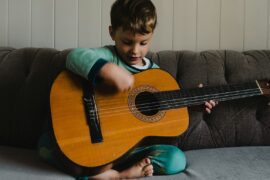By Dr. Laura Markham
“Two-year-olds argue with their parents 20 to 25 times an hour.” – Study reported in Child Development Magazine
Between 11 and 15 months, we learn a powerful word: “No!”
It’s an inspiring discovery. We learn we are separate, autonomous beings with a will of our own who can impact what happens in the world. We revel in saying “No!” at every opportunity.
Our “No” is actually a big “YES!”
It’s an exuberant expression of our life force, our desire to find our place in the world.
Our parents are usually less than delighted. In fact, this developmental stage launches what’s often called the “terrible twos”. So our vocal expressions of primal life force aren’t usually affirmed. Do you remember your father or mother saying:
- “I love your independence and autonomy!”
- “I see that you’re learning to stand up for your own truth!”
- “That strong inner compass will really help you throughout your life.”
More common messages are along the lines of:
- “Don’t you dare talk back to me!”
- “We’ll nip this defiance in the bud!”
- “She has to learn respect and obedience!”
It’s understandable that we have a hard time when our child starts to express her own will. This is expressed perfectly in the internet meme that says:
“Honey, when you grow up, I want you to be assertive, independent and strong willed. But while you’re a kid, I want you to be passive, pliable, and obedient.”
But some parents, instead of realizing that the child’s behavior is age-appropriate, are so upset by their child’s “No!” that they threaten punishment. There is almost always the withdrawal of love, as parents walk away when little ones tantrum. Unfortunately, emotional displays are the only way young children know to make their “No” heard.
Being needy and utterly dependent, we learn to hide our “Nos”. We begin to resort to whining, passive resistance, and manipulation.
By the time we reach adulthood, we’ve often lost touch with our own needs and even our own inner compass. We find ourselves saying “Yes” even when we don’t want to. We wish that we could feel good about sticking up for ourselves, about saying “No” sometimes.
So when we have a child of our own and he begins to assert his autonomy with the word NO, danger signs often flash inside us. We know that NO is dangerous, even if we don’t know why. We think we MUST teach him who’s in charge, right away. Defiance from our child, whether two or twelve, is met with an emotional slap-down as we put him in his place.
But defiance isn’t dangerous. Defiance is simply a sign that your child is having a problem. When we rush in with an iron fist, we don’t address the real issue. Which might be that she feels you aren’t listening. Or that she’s really upset and needs your help to feel safe enough to cry. Or that she needs you to teach her how to express her needs and wants without attacking the other person.
Or maybe she’s just unwilling to let herself be intimidated by someone bigger and more powerful — which is actually a sign of integrity.
If she’s a tween or teen, that should make you rejoice. This is a child who thinks for herself!
Research shows that teens who are willing to stand up to their parents are also more likely to stand up to their peers.
After all, she could just lie to avoid a confrontation with you, which is what most teens do.
But you might also celebrate your child’s willingness to stand up for his own truth even if he’s a toddler. That’s when the inner compass starts to take shape. He’s telling you that he’s not willing to give up what’s important to him just because you’re using force or intimidation. But if you prioritize connection, even strong-willed kids will work with you. When the connection is strong enough, they’re willing to give up what they want to follow your lead.
So respecting your child’s “No” doesn’t mean you have to say yes to whatever he wants. Your child knows you’re in charge. This is about your child’s right to his feelings, even while you honor your responsibility to keep him safe and healthy, and to set necessary limits on behavior.











